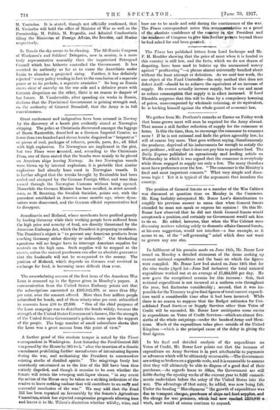A further proof of this resolute temper is noted by
the Times correspondent in Washington. Last Saturday the Food Contrel Bill was passed by the House by 365 to 5, "after the insertion of a drastic amendment prohibitiug further manufacture of intoxicating liquors during the war, and authorising the President to commandeer existing stocks of distilled spirits." The misgivings freely but mistakenly entertained as to the fate of the Bill have been thus entirely dispelled, and though it remains to 'be seen whether the Senate will retain the sweeping anti-liquor clause, " in any event the action of the House may be taken as a striking indication of the resolve to leave nothing tuideae that will contribute to an eat' la and successful conclusion of the war." We may add that the Food Bill has been repoeted PA favourably by the Senate's Agriculture Committee„whiels has rejected compromise proposals allowing beer and leaves it to Mr. Wilson's discietion whether whisky, wine, and beer are to be made and sold during the continuance of the war. The Times correspondent notes thisnreopmmendation as a proof of the absolute confidence of the country in the President and the readiness of Congress tq give him,-further powers beyond those he had asked for and been granted.


































 Previous page
Previous page